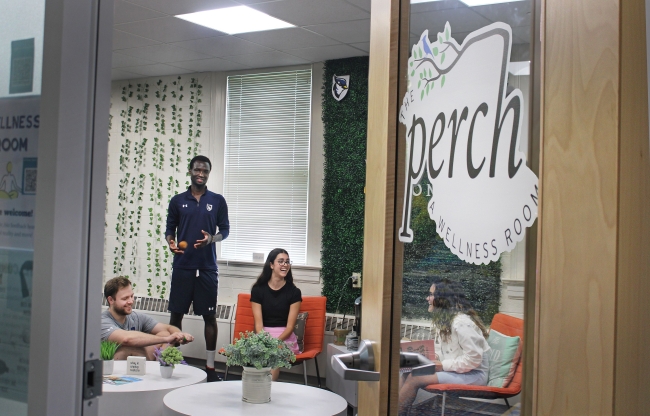You have /5 articles left.
Sign up for a free account or log in.

Incoming students at the University of Saint Joseph can participate in a new coaching program designed to help those with executive dysfunction.
University of Saint Joseph
Due to remote instruction and pandemic-related learning loss caused by COVID-19, higher education professionals are adjusting to a new kind of student—one with increased anxieties and less in-person engagement.
University of Saint Joseph’s director of accessibility Abby Dorman noticed a trend that students in general, not just those with disabilities, felt uncomfortable on campus and had trouble connecting with their peers.
“We saw some areas where students were lacking executive function … but more so, they were struggling with social interaction and social connectivity,” Dean of Student Life Brandon Dawson explains.
In response, USJ’s Office of Accessibility Services partnered with the Center for Wellness Development to establish the Xenia program, open to any student who self-identifies as needing individualized assistance in these areas. “Xenia” is a Greek word that reflects the ancient concept of hospitality, a core value of USJ.
The program, starting this semester, is designed to provide personal assistance in life, social and executive function skills through peer mentorship, with the goal of participants being more self-sufficient by the end of the term or academic year.
How it works: Enrollment in the program will vary on a semester-by-semester basis, with 10 students participating in fall 2023.
To help students recognize if the Xenia program is right for them, Saint Joseph’s website lists some questions:
- Are you motivated, but struggle with organization and time management?
- Do you have difficulty transitioning to new settings?
- Do you have a learning or social/emotional difference?
- Do you typically need extra support?
- Are you easily distracted and readily lose motivation?
The application asks students to describe their learning style, academic strengths and challenges, expectations for the program, social strengths and challenges, and concerns about campus life, among other topics.
The ideal candidate is one who might be hesitant to engage but is willing to try and take that risk, Dawson says. “I described it like, I want a student who was willing to go up, but keep those bumper guards up on the bowling alley.”
Once in the program, students meet weekly with a Xen guide, an upper-level student who serves as a mentor. “The goal here is kind of mimic that Greek life, big-little connection in the sense of having somebody that is really there for you,” Dawson says.
This fall, five Xen guides will support two students apiece, working between five to seven hours per week for an hourly wage.
Find a friend: Xen guides will also be available in dining halls during lunch and dinner times Monday through Friday to provide a safe space for students to enjoy a meal.
“If students don’t feel comfortable, or they’re just unable to find somebody that they’re friends with and had a hard time connecting, they know that at 12:30, Ashley will be at the table to the right, we know we can go eat lunch with Ashley,” Dawson explains.
At least once a week, Xen guides will also attend a campus event, giving another opportunity for students to participate with a buddy.
“We felt like it’ll really help those students start to develop confidence, even going alone, that sometimes it’s okay to go to a movie alone, or it’s okay to go watch a game alone,” Dawson says. “But it’ll help them develop those relationships and conversation to have small talk.”
During the term, Xen guides will start being available a little less for scheduled events, in the hopes that students will build their own self-efficacy and confidence.
Measuring success: There are no specific outcomes for the program participants by the end of the term, because each student will have their own strengths and challenges, Dawson says.
Program staff will take a baseline measurement of students’ comfort levels and will measure over the course of the semester how that’s changed. Some metrics include referral to other support services, use of other support services, number of connections to the Xen guide and student self-assessment.
Because the program is in its infancy, Dawson sees opportunities for leadership to pivot and adjust to student needs as they receive feedback from participants and mentors.
If your student success program has a unique feature or twist, we’d like to know about it. Click here to submit.




